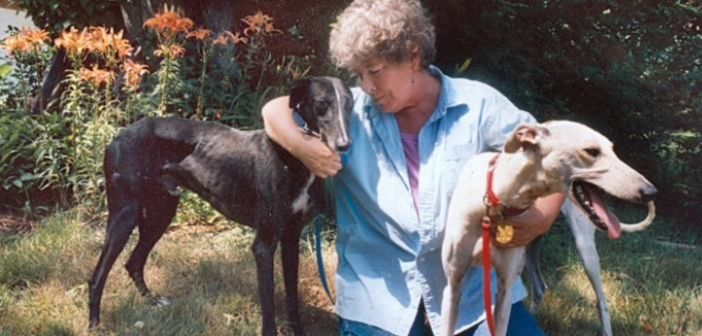The greyhound racing industry treat dogs as if they were expendable. Dogs are bred at much higher rates than will be used used for racing, and even those who do race successfully will only be champions for so long, whether because of age or injury. This means as long as the racing goes on, the industry churns out a surplus of unwanted dogs.
Greyhound rescuers are there to pick up the pieces, to take in the dogs who have been used up and tossed aside and find them a loving family to grow old with. Louise Coleman, author of Boston Boy: A Greyhound Journey, was involved in greyhound rescue for over 30 years, and remains involved today in greyhound advocacy. In an interview with Louise, we spoke about her decades of experience in greyhound rescue and how things are different for greyhounds now.
Dylan Forest: Your book, Boston Boy, is named after your family’s first greyhound. How did that first dog inspire you to begin working in greyhound rescue?
Louise Coleman: Boston Boy was a champion racer who ended his racing career at five years old. When I first saw him on Mothers’ Day in 1983 I was struck by how beautiful he was. A lovely brindle, with wide, alert eyes, he was wary but not spooky. My son, Nolan, and I bundled him into our Pinto and drove him home. He stood up the whole way.

Boston Boy was a magnificent dog. As I got more used to having him around it became more and more obvious that he was extremely intelligent, sweet, and accommodating. I also realized that dogs like him were being destroyed by the thousands. Boston Boy had been fortunate to end his racing career in the kennel of a trainer who was willing to make the effort to find a good home for him, but not all racing greyhounds are that lucky.
Boston Boy’s every day name became Shadow. He followed me around our small apartment for quite a while until he become more oriented to living in a home and more sure of himself. The impetus to find good homes for these wonderful dogs began because the dogs were so deserving and because Boston Boy’s trainer began calling me on a regular basis to ask if I wanted another one, and another one, etc. I started asking local newspapers and TV stations to let the public know about these beautiful dogs who were desperate for good homes.
A racing career can wreak havoc on a dog, physically and mentally. In your experience, how are rescued greyhounds different from other dogs? Should adopters be prepared for specific challenges?
In the U.S. and other more regulated countries, a main characteristic of racing kennels has been the regimented lives the dogs have. They go out, eat and sleep on a daily rotation. In the U.S., greyhounds raced 2 or 3 times a week. This was not a great life by any means. On the other hand, one of the reasons many greyhounds could transition to their adopter’s work schedules was because they were used to schedules.
At this point more and more adoptable sight hounds are coming from Ireland and Spain. Some of the characteristics of racing greyhounds are still relevant but their is more diversity because they come from a less standardized background. It is key to a successful adoption to take into account each dog’s temperament and suitability to particular homes. It doesn’t make sense to place shy, tentative dogs in lively city neighborhoods, and dogs with high prey drives may be too “keen” to live with small dogs and cats.
Do you think greyhound racing should be outlawed entirely?
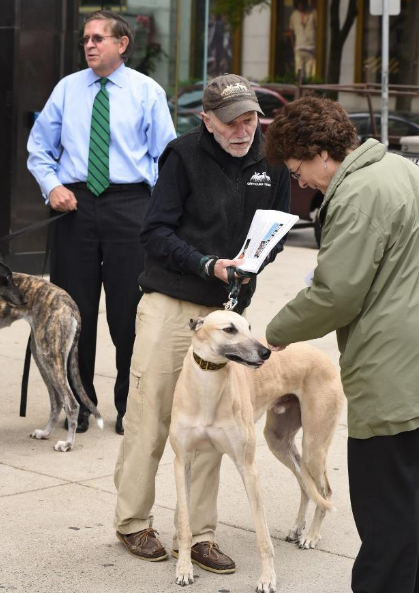
Especially at the beginning of my efforts to help greyhounds in the early ’80’s I did not overtly focus on being anti-racing. There wasn’t a lobby for greyhounds then. I focused on bringing as many greyhounds as possible into our placement program. I also worked diligently to bring as much media attention as possible to encourage the public to see greyhounds as elegant companions. I remember vividly walking Shadow/Boston Boy through Harvard Square in Cambridge. People would stop and ask me if he was “a greyhound or a dog.” We had a long way to go in establishing a positive public image for greyhounds.
Your book mentions greyhound racing industries and rescue operations around the world. Is this problem the same everywhere, and should it be addressed the same way?
Greyhound racing is ending in the United States. Now more and more greyhounds are being sent to countries with little or no animal welfare regulation. The worst countries for greyhounds are China, Pakistan, and Vietnam.
The worst development in greyhound racing has been the transport of the dogs to countries were they are treated like machines. It seems beyond horrible to me that greyhounds are boiled alive in meat markets. They are so sensitive, gentle, and are such good sports. To have them so tortured is surreal. An important task is educating the public about this travesty and asking that people demand that the dogs not go to such terrible fates. An intrinsic problem is how to show this torture with out turning people away. There has to be a solution presented. Just telling people about the abuse is a non-starter.
What are the biggest lessons you’ve learned about dogs in your years of rescue?
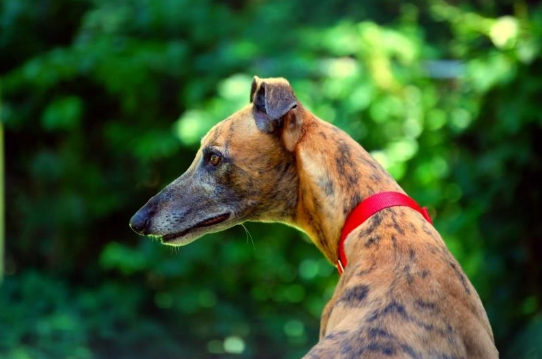
Dogs are so trusting. They deserve to be with people worthy of that trust. I remember a shy, small, black girl greyhound who escaped and was lost down the street from the adoption kennel I founded. She was extremely wary of people, but she trusted me because while she had been at the kennel waiting for the right family to adopt her I had fed her and taken her out to play. I was most impressed by her sense of loyalty and intelligence when I saw her on the road. When I turned around and started walking back to the kennel, she followed me. I frequently called her name and she kept her distance but continued following me back to a place where she knew was safe. She knew that I would not let her down. Her trust was a bond that I would never forsake.
What are the biggest lessons you’ve learned about humans?
I have learned an assortment of lessons about people. I cannot fathom how anyone can watch a dog be boiled to death. This is what happens in some meat markets. This is monstrous behavior. A total lack of empathy is horrendous to see. I find equally horrible the emotional amnesia that allows people in the racing industry to see dogs to such circumstances.
Rather than try to comprehend this toxic destruction I focus on doing what I can to persuade the public to protest the transport of greyhounds to grim lives and tortured deaths. I would never have thought all those years ago that after finding homes for thousands of greyhounds and hounds, this current travesty would occur. There are at least ten thousand greyhounds in China now.
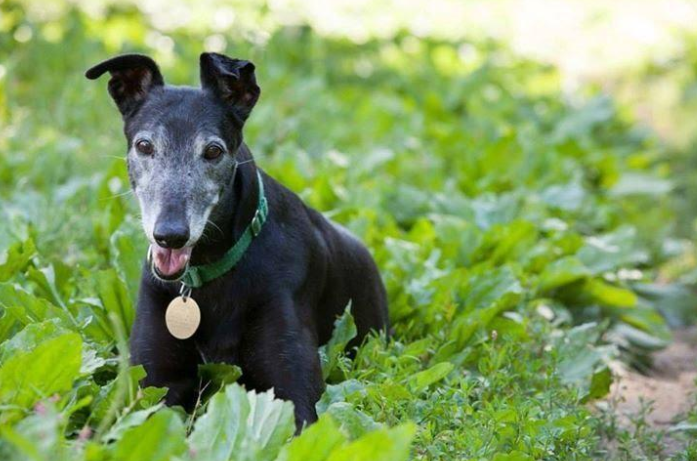
What is the relationship like between rescue and the racing industry? Does the industry want its so-called “retired” dogs to enter into rescue and adoption, or is the relationship more adversarial?
There were a variety of racing industry personnel that I dealt with. Some were willing to make the effort to help the dogs in their care get a home. They would hold the dogs until we could make room in the adoption kennel. Other people were not so compassionate – they were not willing to cooperate. Some just didn’t like anyone they perceived as anti-racing. These days, relationships with people involved in racing are different because the dogs are more often than not racing in other countries.
Has greyhound rescue changed since you started in it? Have things improved for the dogs involved in racing at all, and are there issues today that weren’t a problem back then?
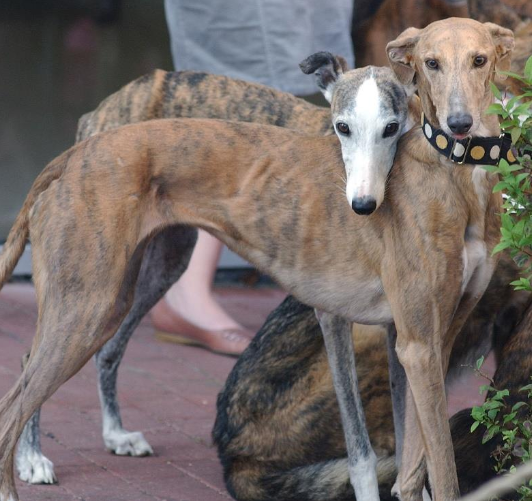
The outlook for greyhounds today is mixed. On the really down side, things have never been worse because the dogs are in countries with little if any animal welfare regulations. The plus side involves all the thousands of greyhounds who have been adopted. The people who have adopted greyhounds are often staunch greyhound advocates who are willing to join with other like minded people to lobby for positive changes.
There is definitely a dearth of adoptable greyhounds in the U.S. now. Greyhounds and galgos (the Spanish cousin of the greyhound) come over from Ireland, Spain, etc. There are also many lurchers (greyhound crosses) here who need homes.
What would your advice be to someone who sees the suffering of racing greyhounds and wants to help? How would you suggest people focus their efforts?
I would suggest people focus on supporting two organizations: Campaign Against Greyhound Exploitation & Death (CAGED), SOS Galgos, and Candy Cane Rescue.
Readers can also follow Boston Boy via the website and Facebook page, where I post regularly about greyhound-related current events and information.
Featured image: Louise Coleman with rehabilitated galgos Magic Johnson (left) and Larry Bird (right). Image via Louise Coleman.

